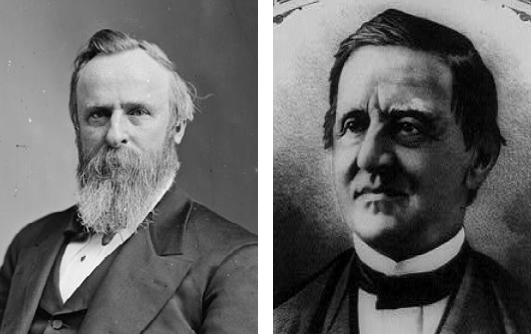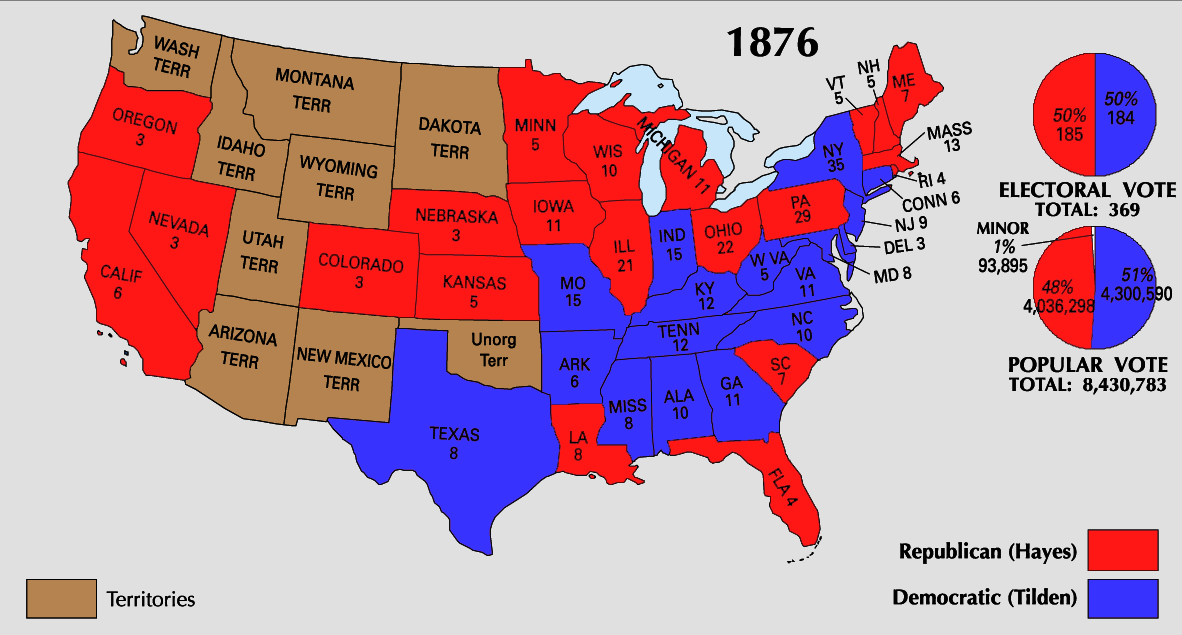 |
| In the Presidential election of 1876 Democrat Samuel Tilden, right, won the popular vote but Republican Rutherford B, Hayes wound up in the White House anyway. |
Don’t
you just love stories about f*cked up U.S. Presidential elections? We
are in the early stages of a lulu. Who knows who will be left standing in November, if
the results will be clear cut, or if we will descend into protracted drama? As we have seen in previous posts, there have been plenty
of screwy elections. None are more
embarrassing than when the winner
of the popular vote somehow doesn’t end up with his feet up on a desk in the White House. It has happened more often than you probably
suspect. Four times in fact. Five for
those who believe Richard J. Daley stole more votes for John F. Kennedy in Chicago than Republican
bosses stole downstate.
In
1824 John Quincy Adams lost the
popular vote to Andrew Jackson by a
slim 44,804 votes nationwide but won when the election was thrown into the House of Representatives and a third
candidate, Henry Clay swung his votes to Adams. Then Adams then appointed Clay Secretary of State. This pissed
off Jackson who raged against a corrupt
bargain and went on to create the modern Democratic Party to whip the New
Englander’s ass in the next election.
In
1888 Benjamin Harrison deprived Grover Cleveland of a second consecutive term despite losing
by 95,713 votes. Four years later the
Democrat was back in office, the
only man ever to serve two non-consecutive
terms.
But
until George W. Bush, those hanging chads, and a stupefying corrupt decision of the Supreme Court, the most famous minority
president was Rutherford B. Hayes.
On
March 2, 1877 Hayes became the first
person selected for the Presidency by
a Bi-Partisan Commission.
Hayes
won the Republican nomination only
after the leading candidate James G.
Blaine failed in six ballots to
win the majority of delegates at the
party convention. A bland
non-entity picked because “he offended no one,” Hayes went into the
election an underdog to Democrat Samuel
Tilden.
Senator James Garfield and Southern Democrats, however, worked out an agreement to prevent trouble. Hayes would withdraw the last Federal troops from the South, end Reconstruction, and appoint at least one Southerner to his Cabinet. By prematurely ending protection
for black voters and office holders in the South, this
bargain ushered in the era of Jim Crow, rigid segregation,
and disenfranchisement of freed Blacks.
The
deal embittered Democrats,
especially Northerners who got nothing out of it and the evolving big city, working
class machine voters who understandably
called the new president His Fraudulency.
| Staunchly Republican Harper's Weekly portrayed the outcome this way. |
Although
the onset of open class war with the
Great Railway Strike of 1877 and continuing fierce Indian warfare in the
West provided plenty of national
excitement, Hayes’s single term reign in
Washington marked by inaction of the hottest political issue of the day—Civil Service Reform and turning
a blind eye to rising White
terrorism in the South. He is best remembered now as the first of the long beard Presidents and because his devout teetotaling wife, Lemonade Lucy gave stupefyingly dull dry dinners and receptions.
Garfield
got the Republican nomination next time around.
We all know how well that turned out.

No comments:
Post a Comment